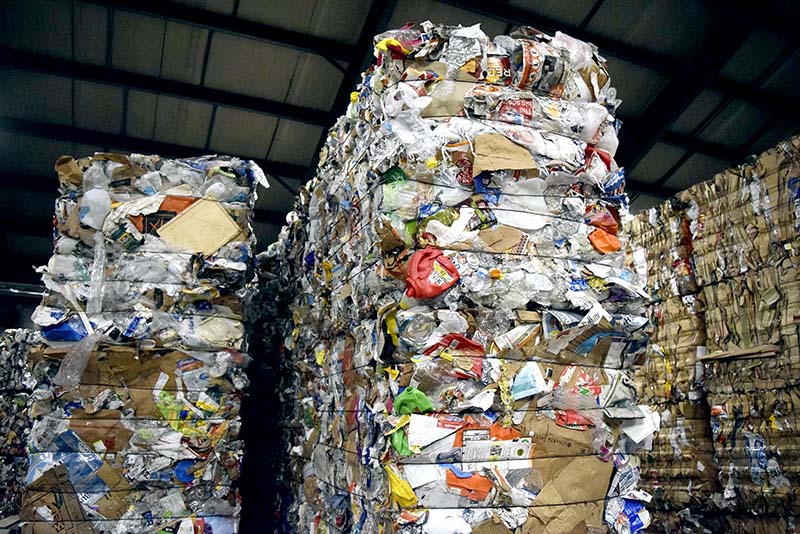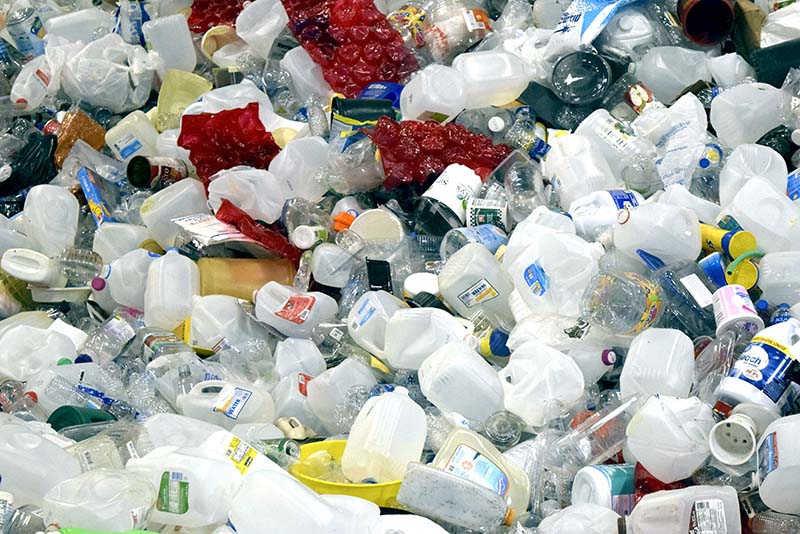Recycling rules
Fort Dodge Public Works, Recycling Center clarify guidelines
-
-Messenger photo by Kelby Wingert
Jason Slinker, operations manager at the Regional Recycling Center, pulls out a piece of clothing from a bundle of recycling on Wednesday afternoon. Clothing and textiles are two items the recycling center does not want to see in residents’ curbside recycling bins.
-
-Messenger photo by Kelby Wingert
An auditor from the city of Fort Dodge Public Works Department will go out ahead of the recycling pick-up to check curbside recycling bins for unwanted items. If a bin includes an unwanted item or if the recyclables are bagged, the auditor will affix an “Oops!” sticker to the bin to inform the resident of the mistake.
-
-Messenger photo by Kelby Wingert
Bales of recyclables sit stacked in the Regional Recycling Center, awaiting transport to the processing facility in Le Mars.
-
-Messenger photo by Kelby Wingert
The Regional Recycling Center accepts hard plastic recyclables like milk and juice jugs, water bottles and plastic coffee cans.

-Messenger photo by Kelby Wingert
Jason Slinker, operations manager at the Regional Recycling Center, pulls out a piece of clothing from a bundle of recycling on Wednesday afternoon. Clothing and textiles are two items the recycling center does not want to see in residents’ curbside recycling bins.
Some Fort Dodge residents might walk out to their curb on recycling day to find their recycling bin hasn’t been emptied and a bright orange “Oops!” sticker has been stuck to it. What does it mean?
The city of Fort Dodge Public Works Department, along with the Regional Recycling Center, are partnering to remind residents of the dos and don’ts of using their curbside recycling bins.
Brett Daniel, director of public works, acknowledges that keeping track of what is and is not acceptable for recycling can be confusing.
“We’ve got plenty of cardboard, but a lot of people still think that pizza boxes are acceptable, and they are not if they’re dirty and have pizza crumbs and sauce on them,” Daniel said.
Right now, the recycling facility’s biggest frustration is plastic grocery bags.

-Messenger photo by Kelby Wingert
An auditor from the city of Fort Dodge Public Works Department will go out ahead of the recycling pick-up to check curbside recycling bins for unwanted items. If a bin includes an unwanted item or if the recyclables are bagged, the auditor will affix an “Oops!” sticker to the bin to inform the resident of the mistake.
The Regional Recycling Center, which is run by the North Central Iowa Regional Solid Waste Agency, compacts and bundles the recycling the city’s trucks pick up each week in order to transport it to a processing facility in Le Mars.
Public Works and the Regional Recycling Center are trying to educate local recyclers to avoid putting the wrong things through the processing equipment in Le Mars. Soft plastics like grocery bags and plastic wrap, along with things they call “tanglers,” like hoses, can wrap around parts of the processing machine and cause stoppages and delays.
“It can harm the equipment,” said Jason Slinker, operations manager of the Regional Recycling Center. “At the facility in Le Mars, the bags get tangled up on these machines. They’re meant to process 40 to 80 tons over the course of a day. Then they have to stop that and get a series of people with knives in there cutting out this film, and that can take a half hour or longer.”
It’s not just soft plastics that aren’t welcome in the curbside recycling bins. Other items that should not be placed in the bins are plastic foam, wrapping paper, wax coated cardboard, clothing, textiles, light bulbs and more.
Daniel also reminds residents to keep the recycling clean, loose and unbagged in the bin, as items that are bagged up will not be accepted.

-Messenger photo by Kelby Wingert
Bales of recyclables sit stacked in the Regional Recycling Center, awaiting transport to the processing facility in Le Mars.
To help spread the word across the community, the city is including a curbside recycling dos and don’ts flyer in every water bill to be mailed in the next two billing cycles.
In the meantime, city staff are on the ground looking to educate from another angle.
“Under normal circumstances on the recycling day, we have our supervisor ahead of the recycling trucks and doing audits,” Daniel said. “He’ll pick a random area in each section of town that we’re doing. He lifts the lid and if he sees things that aren’t recyclable, he puts an ‘Oops!’ tag on it and marks what’s in there — so if it’s a soft plastic or something else that’s not supposed to be in there, that way we’re trying to educate them when we’re out there.”
The recycling truck that follows will not pick up bins with the orange “Oops!” stickers and residents will need to remove the unacceptable item or items and remove the sticker before they set the bin out for the next recycling day.
The city of Fort Dodge recycled 1,105 tons in fiscal year 2019, Daniel said.

-Messenger photo by Kelby Wingert
The Regional Recycling Center accepts hard plastic recyclables like milk and juice jugs, water bottles and plastic coffee cans.
There are currently around 9,000 recycling bins used by residences throughout the city.
“We really have no choice but to clean it up,” Daniel said. “It’s in residents’ hands. We’ll continue to do audits until we hopefully clean things up. It’s really in their hands to try to do what’s right and we’ll answer any questions we can.”
Residents who are unsure if an item is recyclable or not can reach out to the Fort Dodge Public Works Department at (515) 955-6139 or the Regional Recycling Center at (515) 955-2781.
E-waste, including TVs, computers, vacuums, electronic toys and stereos, as well as household hazardous materials like batteries can be taken directly to the Regional Recycling Center for recycling.
Daniel emphasized that the department still encourages residents to recycle.
“We want people to recycle, it just has to be in the correct way,” he said.








